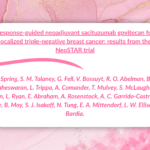
Currently, chemotherapy combined with immunotherapy for bladder preservation has met the clinical needs of some muscle-invasive bladder cancer (MIBC) patients, offering a potential balance between effective tumor control and improved quality of life. However, for MIBC patients who are intolerant to platinum-based chemotherapy, bladder-preserving strategies still require further exploration. At the recently held ASCO-GU Annual Meeting, Dr. Peng Zhang’s team from West China Hospital, Sichuan University, presented the HOPE series studies, among which the HOPE 03 study showcased the efficacy of ADC combined with immunotherapy in bladder preservation for MIBC patients. Urology Frontier invited Professor Zhang to share the key highlights of this research.Urology Frontier: What Are the Challenges and Unmet Clinical Needs in Standard Treatments for MIBC Patients Seeking Bladder Preservation?
Dr. Peng Zhang explained that the demand for bladder-preserving treatment in MIBC patients is increasing. Currently, the guideline-recommended standard treatment for MIBC consists of cisplatin-based neoadjuvant chemotherapy followed by radical cystectomy. However, in clinical practice, both patients and their families are expressing a growing preference for bladder preservation.
He emphasized that some MIBC patients achieve complete clinical and pathological remission through neoadjuvant chemotherapy or combined neoadjuvant treatment strategies, allowing them to pursue bladder preservation. For those who do not respond, both physicians and patients actively seek and explore comprehensive treatment strategies that can effectively control tumors while also preserving the bladder and improving quality of life. As clinical research continues to advance and medical technology evolves, the demand for bladder-preserving treatment will persist, driving the need for more innovative therapeutic approaches.
Urology Frontier: Your Team Has Been Exploring ADC-Combined Immunotherapy for MIBC Patients and Presented Your Findings at ASCO-GU. How Effective and Safe Is This Treatment?
Dr. Peng Zhang shared that at this year’s ASCO GU meeting, his team presented findings from the HOPE 02 and HOPE 03 studies, both part of the HOPE series.
The HOPE 02 study focused on chemo-immunotherapy combined with sequential radiotherapy for bladder preservation. With a median follow-up of over 36 months, the overall survival rate and disease control rate in this study surpassed previously reported international studies of similar nature.
The HOPE 03 study evaluated the comprehensive bladder-preserving strategy using ADC combined with immunotherapy and sequential radiotherapy. Although some patients had not completed efficacy evaluation by the time of abstract submission (51 enrolled, 46 reported), preliminary results indicate strong clinical potential. The clinical complete response (cCR) exceeded 56%, the disease control rate (DCR) was over 90%, and the objective response rate (ORR) was also remarkable. These findings suggest that ADC combined with immunotherapy and radiotherapy represents a promising comprehensive approach for bladder preservation. The publication of these results not only provides a clinical basis for new bladder-preserving strategies but also lays the groundwork for exploring more effective and safer treatments in the future.
Regarding safety, the HOPE 03 study results indicate that the overall incidence of adverse events (AEs) was relatively low. Most adverse effects were mild (Grade 2 or below), demonstrating that this novel treatment strategy has a favorable safety and tolerability profile.
Urology Frontier: Based on Research and Clinical Experience, Which Patients Are Most Likely to Benefit from ADC-Combined Immunotherapy?
Dr. Peng Zhang noted that antibody-drug conjugates (ADCs) have become a research hotspot in urothelial carcinoma. ADCs used in this field can be categorized into three major types. The first category includes nectin-4 targeted therapies, such as Enfortumab Vedotin (EV), which have received breakthrough therapy designation. Since nectin-4 is widely expressed in urothelial carcinoma, no biomarker testing is required before treatment. The second category consists of Trop2-targeted therapies, such as Sacituzumab Govitecan (SG), which are not yet available in China. The third category involves HER2-targeted therapies, such as RC48, which are more widely used in China and require HER2 expression testing to determine the most suitable patient population.
In the HOPE 03 study, the research team primarily included patients with HER2 IHC 2+ or higher, and the preliminary results demonstrated significant efficacy. In clinical practice, physicians should tailor ADC-based therapy according to the patient’s tumor immunophenotype and target expression profile. However, the optimal patient selection criteria remain undetermined, and ongoing studies, including companion diagnostics, aim to refine individualized treatment strategies in the future.
Urology Frontier: EV, RC48, and Other ADC Therapies Have Been Integrated into Urothelial Cancer Treatment. How Do You View Their Impact on Future Clinical Practice?
Dr. Peng Zhang explained that the regulatory approval process for targeted and immunotherapy drugs through agencies such as the FDA and CDE typically follows a stepwise approach. These therapies are initially approved for late-line treatment, then expanded to first-line treatment for advanced cases, and eventually applied in perioperative and neoadjuvant settings. While these therapies are currently used primarily in late-line treatment, multiple studies have demonstrated their significant potential in perioperative, neoadjuvant, and bladder-preserving treatment models.
He emphasized that ADC combined with immunotherapy opens new treatment avenues and offers enhanced efficacy through a comprehensive approach. ADC drugs hold revolutionary significance in urothelial cancer treatment—not only improving tumor control but also making bladder-preserving treatment possible, significantly enhancing patient quality of life. This innovative treatment paradigm lays the foundation for future developments in comprehensive urothelial cancer therapy and will drive the evolution of treatment models.
Dr. Peng Zhang
West China Hospital, Sichuan University
- Chief Physician, MD, Master’s Supervisor
- Specializes in systematic and minimally invasive diagnosis and treatment of urological tumors, particularly in: Surgical and comprehensive treatment of bladder cancer Bladder preservation strategies for elderly bladder cancer patients Management of complex and rare urological diseases
- Current Positions: Member, Urological Oncology Group, Chinese Medical Doctor Association Member, Bladder Cancer Group, Chinese Anti-Cancer Association Urology Committee Member, Bladder Cancer Quality Control Expert Committee, National Cancer Center Secretary & Committee Member, Urology Committee, Sichuan Medical Doctor Association Head, Bladder Cancer Personalized Treatment Group, Sichuan Medical Doctor Association Member, Urological & Male Reproductive Tumors Committee, Sichuan Anti-Cancer Association Standing Member, Urology Committee, Sichuan Rehabilitation Medical Association Standing Member, Urology Committee, Chengdu High-Tech Medical Association Visiting Scholar at Beth Israel Deaconess Medical Center, Harvard Medical School Trainer, Minimally Invasive Surgery Training Center, Chinese Urological Association
With extensive research contributions in bladder cancer surgery and comprehensive treatment, Professor Zhang continues to drive clinical innovation and advancements in bladder-preserving strategies.


